During ACR Convergence 2020 in early November, the ACR and ARP honored a group of distinguished individuals who have made significant contributions to rheumatology research, education and patient care. This month, The Rheumatologist speaks with the winners of the ARP Merit Awards and the ACR’s Distinguished Fellows. In addition, we bring you the first ever ACR Distinguished Global Public Health Award winner.
Review the winners of the ACR Awards of Distinction and designated Masters in the November issue.
ARP MERIT AWARDS
Presidential Award
The ARP President’s Award is awarded to the ACR/ARP member or team performing outstanding service within the present year in advancing the goals, ideals and standards of the ARP. ARP President Janet L. Poole, PhD, OTR/L, FAOTA, announced the decision this year was clear: The award is bestowed on the entire ARP membership for their tireless efforts in this challenging year.
ARP Masters
 Teresa J. Brady, PhD, a behavioral scientist, and senior consultant with Clarity Consulting and Communications, has been designated an ARP Master.
Teresa J. Brady, PhD, a behavioral scientist, and senior consultant with Clarity Consulting and Communications, has been designated an ARP Master.
“The ACR/ARP has been my professional home throughout my career—the place I turned for the latest scientific information, the professional resources I needed and, most importantly, where I could interact with past, present and future luminaries in the field,” Dr. Brady says. “I’m thrilled to receive this honor from the ARP.”
Dr. Brady earned her doctorate in psychology from the University of Minnesota, Minneapolis, and holds a bachelor’s degree in occupational therapy from the University of North Dakota, Grand Forks. Before joining Clarity Consulting, she served as a senior behavioral scientist with the Centers for Disease Control and Prevention’s (CDC’s) Arthritis Program for nearly 20 years. While at the CDC, Dr. Brady guided state arthritis programs in their dissemination of evidence-based self-management education and physical activity interventions, provided guidance to researchers developing and evaluating public health interventions for arthritis, conducted extensive qualitative research on the perceptions of people with arthritis and practitioners working with them, and developed health communications campaigns.
Dr. Brady’s current work in rheumatology is concentrated on serving as the scientific editor of the revision of the ARP’s online Fundamentals of Rheumatology Course (FRC).
A long-time volunteer with both the ACR and the ARP, Dr. Brady says it’s been a pleasure to work with an outstanding project team and ARP experts on the FRC to define essential information for someone new to rheumatology and identify dynamic and engaging presentation methods.
“There have been a multitude of changes over my long career,” Dr. Brady says. “Medication management, particularly in inflammatory arthritis, has changed significantly—from aspirin to NSAIDs and from gold salts to biologics—all of which lead to radically improved prognosis and health outcomes.”
Similarly, Dr. Brady notes how the field has evolved from emphasizing rest to actively promoting exercise and physical activity, based on science proving that exercise is not only safe, but essential, to good health.
“The final change is the recognition that the patient is the day-to-day provider, so our roles are evolving into more of a coach and consultant to help patients get better and better at managing their disease,” Dr. Brady says.
 Patricia Katz, PhD, professor of medicine, health policy and urology at University of California, San Francisco (UCSF), also received the ARP Master designation.
Patricia Katz, PhD, professor of medicine, health policy and urology at University of California, San Francisco (UCSF), also received the ARP Master designation.
Dr. Katz received a master’s degree in psychology and a doctorate in educational measurement from the University of South Carolina, Columbia. She joined UCSF in 1982, and her research has focused on rheumatoid arthritis (RA) and systemic lupus erythematosus (SLE), the measurement of patient-centered outcomes and the impact of lifestyle factors, including obesity, physical activity and sleep, on patients. Dr. Katz’s research has also examined disparities in health outcomes.
Over the years, Dr. Katz has served on the ARP Program Committee and the ACR Subcommittee on Diagnostic, Classification and Response Criteria, and has chaired two task forces. She has also served on the Scientific Advisory Committee and Board of Directors for the Rheumatology Research Foundation. This year, she is the ARP’s Distinguished Lecturer.
A past editor in chief of Arthritis Care & Research and the current co-editor in chief of ACR Open Rheumatology, Dr. Katz received the ARP Distinguished Scholar Award in 1997, the STAR Award in 2005, and the ARP Presidential Award in 2003 and 2010. In addition, she was a recipient of the ARP Lifetime Achievement Award in 2015 and the ACR Investigative Mentoring Award in 2019.
“Over the past 30 years, my work in the rheumatology world has allowed me to connect with so many wonderful people,” Dr. Katz says. “I’ve also witnessed a greater integration of clinical and health services research.”
Dr. Katz has had more than 270 peer-reviewed manuscripts published. She is currently the principal investigator of two studies, funded by the National Institutes of Health (NIH) and the Department of Defense, on the impact of sleep disturbances on rheumatoid arthritis and lupus patients, and co-investigator of the California Lupus Epidemiology Study (CLUES) and two NIH-funded studies of effective use of patient-reported outcomes in electronic health systems. She is also co-investigator of the UCSF Resource-Based Center for the Advancement of Precision Medicine in Rheumatology, an NIH/NIAMS-funded center, with the goal of facilitating and enhancing precision medicine studies in rheumatic diseases.
One aspect of her job that she especially enjoys is serving as a career and research mentor. As co-director of the UCSF Rheumatology Division’s mentoring program, Dr. Katz has worked with postdoctoral students and fellows. She has also mentored junior rheumatology fellows and introduced them to the ACR/ARP.
“It’s been nice to see more women become involved with rheumatology research over the years,” Dr. Katz says. “It’s a great field, and I continue to enjoy my job and everyone that I work with.”
Lifetime Achievement Award
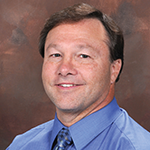 Scott Hasson, EdD, PT, FACSM, FAPTA, editor, Physiotherapy & Practice, is the recipient of the 2020 Lifetime Achievement Award for demonstrating a sustained and lasting contribution to the field of rheumatology and rheumatology professionals.
Scott Hasson, EdD, PT, FACSM, FAPTA, editor, Physiotherapy & Practice, is the recipient of the 2020 Lifetime Achievement Award for demonstrating a sustained and lasting contribution to the field of rheumatology and rheumatology professionals.
“Clearly, I recognize I’m getting older,” Dr. Hasson says with a laugh. “But on a more serious note, the achievement means I’m recognized as a professor and editor in chief, someone who is now at a point in their career as a mentor who provides advice to others on how to achieve their goals as researchers, clinicians and educators. I had always hoped to make an impact in the rheumatology field, and receiving this award is confirmation I have.”
Dr. Hasson received his bachelor’s degree in microbiology and his master’s degree in physical education from California State University, Fresno. He went on to receive a doctorate in exercise physiology from the University of Northern Colorado, Greeley, and a second bachelor’s degree in physical therapy from the University of Texas, Medical Branch, Galveston.
He has been active in research over the course of his career and has had 86 peer-reviewed research articles published, along with a textbook titled, Clinical Exercise Physiology, and presented more than 150 papers at sports medicine and rehabilitation meetings. In 2016, Dr. Hasson retired as chair of the Department of Physical Therapy at Augusta University, Georgia. He is currently serving as editor in chief of the journal Physiotherapy & Practice, a position he has held since 1996.
Over the course of his career, Dr. Hasson taught and led physical therapy departments at Texas A&M University, College Station; the University of Connecticut, Storrs; Angelo State University, Texas; and Baylor College of Medicine, Houston.
“When I started working in rheumatology in the early ’80s, patients with RA and OA were being told to minimize their activity in order to protect their joints,” Dr. Hasson says. “Treatment was primarily medical and passive therapies almost wholly focused on reducing pain.”
As an exercise scientist, Dr. Hasson says it’s gratifying to now see patients affected by chronic back, neck, shoulder, hip and knee pain prescribed exercise therapy as part of their treatment plan.
“My focus has always been on improving patients’ physical condition [strength and endurance] in order to allow them to work,” Dr. Hasson says. “This approach proved successful and is now widely used to help patients reduce their pain without damaging their joints.”
Addie Thomas Service Award
 Paul Adam, MSW, who retired in 2019 from his position as rheumatology liaison and outreach services coordinator at the Mary Pack Arthritis Program, Vancouver, British Columbia, Canada, received this year’s Addie Thomas Service Award, honoring the ARP’s first president, and recognizing active volunteer involvement in local, regional and national arthritis-related activities.
Paul Adam, MSW, who retired in 2019 from his position as rheumatology liaison and outreach services coordinator at the Mary Pack Arthritis Program, Vancouver, British Columbia, Canada, received this year’s Addie Thomas Service Award, honoring the ARP’s first president, and recognizing active volunteer involvement in local, regional and national arthritis-related activities.
A clinical counselor, program coordinator and researcher for more than 25 years, Mr. Adam joined the ARP in 1990 and was a member of the ARP Executive Committee, participating in the development of the ACR/ARP online Learning Management System.
“When I look back at those who have been past Addie Thomas Service Award recipients, I see the names of people who I’ve admired and respected for years and, at some unconscious level, sought to emulate,” Mr. Adam says. “They are some of the many leaders in our field, people who have made advances through research, clinical care and service to ARP. And therefore, although it may sound trite, receiving this award is truly an honor.”
Mr. Adam graduated from the University of Western Ontario in London, Ontario, Canada, with a bachelor’s degree in social work, and the University of British Columbia in Vancouver, with a master’s degree in social work. He began working at the Mary Pack Arthritis Program in 1989, first as a clinical social worker and then as the rheumatology liaison and outreach services coordinator.
“I was lucky to work at an outpatient program that for many years not only valued but put into practice the belief that it was important for research, treatment and education to inform the other,” Mr. Adam says. “Thus, working at the Mary Pack Arthritis Program allowed me to provide clinical care, participate in patient and professional education, engage in research, and contribute to professional organizations like the ARP. Receiving this award validates the role that generalists can play in the field of rheumatology.”
Mr. Adam was also part of a team of researchers that created and tested an online health journal for patients with rheumatoid arthritis. One component of the tool allowed study participants to assess their disease activity and then provided them with information tailored to their level of disease activity in terms of what this meant (e.g., to have moderate disease activity) and recommended actions. Mr. Adam says this especially helped patients with fluctuating disease activity and assisted participants in discerning when to consult with their healthcare provider.
“I believe that this is an area of rheumatology that will continue to grow and evolve as eHealth becomes a more accepted part of clinical care,” Mr. Adam says.
Ann Kunkel Advocacy Award
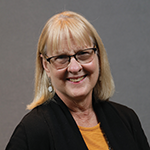 Donah Zack Crawford, MA, director of clinical trials at the Arthritis Group, Philadelphia, received the Ann Kunkel Advocacy Award, presented to an ARP member who has provided extraordinary service to advocate for patients with arthritis and other rheumatic diseases or for health professionals in rheumatology.
Donah Zack Crawford, MA, director of clinical trials at the Arthritis Group, Philadelphia, received the Ann Kunkel Advocacy Award, presented to an ARP member who has provided extraordinary service to advocate for patients with arthritis and other rheumatic diseases or for health professionals in rheumatology.
In the mid-1990s, Ms. Crawford was diagnosed with rheumatoid arthritis (RA), which changed her career trajectory. At the time, she was working as a research coordinator at the University of Pennsylvania, focused on premenstrual syndrome and perimenopause.
“My rheumatologist, Bruce Hoffman, MD, the Arthritis Group, Philadelphia, knew I was interested in research and asked if I might be interested in coordinating a clinical trial for RA,” Ms. Crawford says.
That was more than 20 years ago, and today, Ms. Crawford and her Corgi, Ferguson, are a welcome sight at the Arthritis Group. Ferguson, a trained therapy dog, rides around in a 1970’s stroller greeting patients.
“Ferguson can tell when a patient is nervous and needs comfort,” Ms. Crawford says. “He often gets requests from patients who are getting infusion treatments.”
Ms. Crawford’s commitment to patients goes beyond the office. She regularly leaves brightly colored index cards in the reception area alerting patients that she’s heading to the state capitol in Harrisburg to speak with legislators.
“As someone who has arthritis, I know how important it is to give our patients a chance to voice their concerns on issues that affect them, such as drug prices and step therapy reform,” Ms. Crawford says. “I also want to ensure they have access to clinical trials.”
Ms. Crawford is a long-time member of the ARP and has served on the Education, Research and Ethics committees, as well as the Annual Meeting Planning Committee. She has also been a regular presenter at ACR Convergence (formerly the ACR/ARP Annual Meeting) and served as the ARP representative to RheumPAC, the ACR’s nonpartisan political action committee.
A longtime supporter of the Arthritis Foundation, Ms. Crawford has volunteered as a costumed Revolutionary and Civil War interpreter at fundraisers, and donates her time to help with the annual Arthritis Walk.
Distinguished Scholar Award
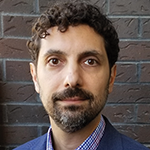 Anthony Perruccio, PhD, a scientist at the Schroeder Arthritis Institute, University of Toronto Health Network, and associate professor at the Institute of Health Policy, Management and Evaluation at the University of Toronto, Ontario, Canada, is this year’s Distinguished Scholar Award recipient.
Anthony Perruccio, PhD, a scientist at the Schroeder Arthritis Institute, University of Toronto Health Network, and associate professor at the Institute of Health Policy, Management and Evaluation at the University of Toronto, Ontario, Canada, is this year’s Distinguished Scholar Award recipient.
Osteoarthritis (OA) is one of the main areas of research for Dr. Perruccio and he says it’s been incredible to see the transition in how OA has been defined, characterized, or viewed over the years. He has also worked to identify distinct subgroups in both clinical and population-based OA samples, with particular focus on systemic inflammation and sex differences.
“OA has gone from local cartilage defects to whole joint disease, from ‘wear and tear’ to biomechanical and biochemical and inflammatory processes, from local effects to local and systemic effects, and importantly, from disease to illness,” he says. “There remains much we don’t know, however, and I suspect our view of OA will continue to evolve as we further research this highly prevalent and high-impact condition.”
Dr. Perruccio received his BSc from York University in Toronto and his MHSc and PhD in epidemiology from the University of Toronto. He completed a post-doctoral fellowship in arthritis outcomes research at Brigham and Women’s Hospital and Harvard Medical School, Boston.
A member of the ARP since 2008, Dr. Perruccio has served as an abstract reviewer and session moderator for the ACR’s annual meeting and has been a member of the editorial board for Arthritis Care & Research since 2012.
“The ARP and its members have been at the forefront of drawing attention to the public health impact of arthritis and bridging the gap between clinical and community health for people affected by arthritis and other rheumatic diseases,” Dr. Perruccio says. “ARP members span and support arthritis research across so many levels and fields of study. Being recognized by these peers and this association is humbling, a privilege and an acknowledgment that my work has made some level of valuable contribution to our collective endeavor to minimize the individual and public burden of arthritis and other rheumatic diseases.”
Distinguished Clinician Award
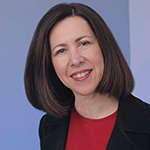 Roberta Horton, LCSW, ACSW, assistant vice president of social work programs at the Hospital for Special Surgery (HSS), New York City, received this year’s Distinguished Clinician Award.
Roberta Horton, LCSW, ACSW, assistant vice president of social work programs at the Hospital for Special Surgery (HSS), New York City, received this year’s Distinguished Clinician Award.
“Receiving this award is cherished recognition that the concept of ‘clinician’ extends not only to direct practice with patients and their families, but includes a holistic perspective and practice with groups, communities and systems to assess and address inequities,” Ms. Horton says. “In social work, we call this process from case to cause. I’m very proud and passionate about the opportunity I’ve been given to play a leadership role with my exceptionally talented and committed colleagues at HSS, and the opportunities provided by the ACR and ARP to learn, grow, and contribute.”
Ms. Horton graduated from the University of Massachusetts, Shrewsbury, with a bachelor’s degree in psychology and from Columbia University, New York City, with a master’s degree in social work. Starting as a social worker in 1977, Ms. Horton’s increasing professional responsibilities provided her with the opportunity to build a new department at HSS, the Department of Social Work Programs.
She says the mission of the Social Work Programs department is to support, enhance and empower the quality of life for those impacted by rheumatic and musculoskeletal illness, maintaining a specific focus on serving diverse communities affected by health disparities.
Over the years, Ms. Horton has developed national and culturally tailored programs that offer support and education to patients with rheumatic diseases. These programs are offered in English, Chinese and Spanish for patients, their families and members of the community.
“I’m constantly in awe of the complexity and challenges of rheumatology as an ever-evolving field,” Ms. Horton says. “Because most rheumatic illnesses are not curable, we have the privilege of knowing and working with patients and their loved ones over decades. The uncertainty and unpredictability of coping with these illnesses requires patient-clinician partnerships that prioritize empathy, humility, shared decision making, in the context of appreciation of the impact of social determinants of health on adherence, severity and long-term outcomes.”
Distinguished Educator Award
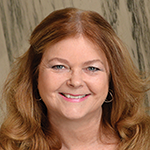 Maura Iversen, DPT, SD, MPH, FNAP, FAPTA, is the recipient of this year’s Distinguished Educator Award. Dr. Iversen is a physical therapist and behavioral scientist/clinical epidemiologist with a primary focus in rheumatology. She works in dual roles as dean of health professions at Sacred Heart University, Fairfield, Conn., and as a behavioral scientist and researcher in rheumatology at Brigham & Women’s Hospital, Harvard Medical School, Boston.
Maura Iversen, DPT, SD, MPH, FNAP, FAPTA, is the recipient of this year’s Distinguished Educator Award. Dr. Iversen is a physical therapist and behavioral scientist/clinical epidemiologist with a primary focus in rheumatology. She works in dual roles as dean of health professions at Sacred Heart University, Fairfield, Conn., and as a behavioral scientist and researcher in rheumatology at Brigham & Women’s Hospital, Harvard Medical School, Boston.
“I’m deeply honored to be receiving this award,” Dr. Iversen says. “My career has focused both on rheumatology research and in the education of future health professionals, and I’ve found they are highly complementary areas of focus.”
As a Harvard/MIT Center for Medical Stimulation-certified specialist, Dr. Iversen has developed and implemented interprofessional, high-fidelity simulations in rheumatology to promote interprofessional collaboration and communication.
“I’ve enjoyed teaching rheumatology fellows, nurses and NPs, physical and occupational therapists and physician assistant students,” Dr. Iversen says. “I’ve learned so much from my interactions from students and I hope they have learned as much from me.”
As a researcher, Dr. Iversen’s interests have included clinical trials of exercise and technologies to promote physical activity in patients with arthritis. She is a past president of the ARP, a former member of the Boards of Directors for the Rheumatology Research Foundation and the ACR, and is currently the arthritis media spokesperson for the American Physical Therapy Association.
Dr. Iversen earned her doctorate in behavioral sciences from Harvard University, School of Public Health, Boston, and completed her postdoctoral training in clinical epidemiology at the Department of Medicine, Harvard Medical School. She earned a Master of Public Health from Boston University and a Doctor of Physical Therapy from MGH Institute of Health Professions, Boston.
As an educator, Dr. Iversen has taught in the areas of rheumatology and musculoskeletal disorders, epidemiology and psychometrics for more than 25 years at Harvard TH Chan School of Public Health at Northeastern University, Boston, and at numerous universities, both in the U.S. and internationally. She has mentored more than 150 graduate students in their master’s and doctoral theses in various health professional programs.
Describing her teaching style, Dr. Iversen says she integrates a number of pedagogies in her teaching, from Kolb’s model of experiential learning to the Socratic method and problem-based/team-based learning.
“I love to promote dialogue and exchange and incorporate life experiences into classroom discussions,” Dr. Iversen says. “Among my research courses, I apply skills learned to clinical scenarios in an effort to promote evidence-based practice and translational research.”
Outstanding Student in Rheumatology
 A licensed physical therapist and PhD candidate at the University of Delaware, Newark, Dana Voinier, MS, DPT, was awarded the Outstanding Student in Rheumatology award.
A licensed physical therapist and PhD candidate at the University of Delaware, Newark, Dana Voinier, MS, DPT, was awarded the Outstanding Student in Rheumatology award.
Her research has focused on the role of physical activity in the development of knee OA. In a study published last year, Dr. Voinier found that while losing weight can help reduce a patient’s risk of OA or ease their symptoms if they already have the condition, being physically active is equally important.
Dr. Voinier received her bachelor’s degree from The College of New Jersey and began her PhD graduate program at the University of Delaware in 2017. Last year, Dr. Voinier and her colleagues at the university presented research at the ACR’s annual meeting that sitting more than four hours a day increases the risk of knee OA as seen on X-rays.
“I feel truly honored to have been selected for this award,” says Dr. Voinier, “and I will continue to work hard and support the work of my peers as an expression of my gratitude.”
Distinguished Fellows
Each year, the ACR honors up to 10 clinical and research fellows who have performed meritoriously. Meet this year’s Distinguished Fellows, who are bridging the gap between research and patient care.
 Christine Anastasiou, MD As an assistant adjunct professor in the Division of Rheumatology at Zuckerberg San Francisco General Hospital and the UCSF Medical Center, Dr. Anastasiou is performing pharmacoepidemiology research in rheumatology.
Christine Anastasiou, MD As an assistant adjunct professor in the Division of Rheumatology at Zuckerberg San Francisco General Hospital and the UCSF Medical Center, Dr. Anastasiou is performing pharmacoepidemiology research in rheumatology.
Her research has focused on patients with systemic lupus erythematosus (SLE) and has examined quality of care, immunosuppressant use, hospitalizations and mortality. Her research has also demonstrated that despite advances in overall all-cause mortality among patients with SLE, hospitalized Black, Hispanic and Asian patients continue to have a higher risk of inpatient death, indicating the need for comprehensive efforts to address social and economic factors to narrow disparities among patients with SLE.
At UCSF, Dr. Anastasiou has also served as a speaker for internal medicine conferences and lectured for the emergency medicine residency program.
“In the coming years, I plan to use well-defined clinical cohorts to conduct trials that help identify and develop new therapies for patients with rheumatic diseases,” she says. “Receiving this award strengthens my confidence and drive to continue working hard to contribute to the field.”
Dr. Anastasiou says her interest in rheumatology began during her clinical rotations in medical school at the David Geffen School of Medicine, University of California, Los Angeles. She completed internal medicine training at the University of California, San Diego (UCSD), and served an additional year there as a chief resident. Dr. Anastasiou went on to pursue a fellowship in rheumatology and a concurrent master’s degree in clinical research at UCSF.
A firm believer in patient education, Dr. Anastasiou participates in community outreach and has appeared on local television news to discuss lupus. She has also appeared as a speaker at the Lupus Foundation of America’s San Francisco Learning and Living Conferences.
A recipient of the 2020 Rheumatology Research Foundation Scientist Development Award, Dr. Anastasiou plans to continue her career as a clinician and clinical researcher and hopes to provide support and guidance to fellows, residents and medical students.
“I recognize that much of my career success is the direct result of being surrounded by people who have been generous with their time, effort and resources, thereby helping guide me with their knowledge and encouragement to develop skills for reaching my career potential,” she says.
Dr. Anastasiou says she is thankful for the dedicated mentorship she’s received, including from her primary research mentor, Jinoos Yazdany, MD, MPH, professor of medicine at UCSF and chief of the Division of Rheumatology at Zuckerberg San Francisco General Hospital.
“I’m also grateful to Andy Gross, MD, director of the UCSF rheumatology clinic and co-director of the Scleroderma Center, who modeled ways to communicate with every patient so they recognize we are listening; Lianne S. Gensler, MD, professor of medicine, Rheumatology Fellowship Program director and director of the Spondyloarthritis Research Program and Clinic, UCSF, for showing me how a physician can be both wholly dedicated to work and family without sacrificing excellence in either; Gabriela Schmajuk, MD, MS, chief of rheumatology, San Francisco VA Health System, who demonstrated how to use technology to maximize impact and efficiency; and Ken Kalunian, MD, professor of medicine at UCSD School of Medicine, who first taught me the joys and struggles of treating patients with rheumatic diseases.”
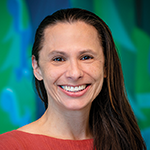 Sarah Baxter, MD, PhD
Sarah Baxter, MD, PhD
A pediatric rheumatologist at Seattle Children’s Hospital and acting assistant professor in the Department of Pediatrics at the University of Washington (UW), Seattle, Dr. Baxter graduated from Yale University, New Haven, Conn., with a degree in molecular biochemistry and biophysics. She went on to complete a combined MD/PhD program at UW, studying immunology and novel genome engineering technologies.
“While these are powerful and exciting tools, we have only a poor understanding of the genetics that cause autoimmunity in kids,” Dr. Baxter says. “Children with severe, multi-system autoimmune diseases pose a unique opportunity: Many patients likely have monogenic, severe genetic defects causing their disease, as has been shown in multiple other subspecialties like immunology, cardiology and gastroenterology.”
During her pediatric rheumatology fellowship, Dr. Baxter worked with Mary-Claire King, PhD, professor of genome sciences and medicine at UW, to identify genetic diseases in a cohort of patients with IPEX (immune dysregulation, polyendocrinopathy, enteropathy, X-linked) like syndrome. These patients have very early onset, multi-system autoimmunity. Dr. Baxter believes that identifying genetic diseases will improve outcomes: Patients with a genetic diagnosis can be offered personalized screening recommendations and treatment based on their intrinsic biology.
In this early study of patients with IPEX-like syndrome, Dr. Baxter was able to identify causative genetic diseases in over one-third of patients. “Of those in whom I identified diseases,” she says, “over 80% would have altered therapeutic recommendations. Unfortunately, this was a retrospective study, and a large number of patients had passed away or been lost to follow-up.”
Dr. Baxter is continuing work with Dr. King and is now pursuing genetic studies in patients with childhood-onset SLE, specifically focusing on rare mutations with severe effects.
“I’m also investigating children who become severely ill with COVID-19 or MIS-C [multi-system inflammatory syndrome] in children. As has been shown in many different infections, such as Epstein-Barr virus [EBV], genetic diseases and predispositions may be uncovered by infection,” she says. “By identifying genetic mutations within immune pathways that predispose to poor outcomes, we may be able to better target therapeutics for a wider range of children.”
Dr. Baxter is a member of the Childhood Arthritis Rheumatology Research Alliance (CARRA), the Clinical Immunologic Society and the Arthritis National Research Foundation. She is also an active member of the Arthritis Foundation and has served as team captain in one of its annual fundraising runs and participates yearly in its summer camp for kids.
Dr. Baxter continues to be motivated by the mysteries behind rheumatic diseases and thanks her mentors in clinical medicine, including Kristen Hayward, MD, MS, associate professor of pediatrics, Division of Rheumatology, UW, and interim academic chief, Pediatric Rheumatology Division, Seattle Children’s Hospital; Clayton Sontheimer, MD, adjunct assistant professor, UW, and director of pediatric rheumatology, St. Luke’s Boise Medical Center, Idaho; Anne M. Stevens, MD, PhD, senior director of adaptive immunity, Janssen Pharmaceutical Companies, Johnson & Johnson, and professor of rheumatology, UW; and Susan Shenoi, MBBS, MS, RhMSUS, interim clinical chief, rheumatology, Seattle Children’s Hospital; as well as her mentor in science, Dr. King.
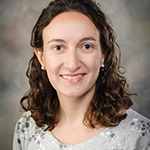 Nicole Bitencourt, MD
Nicole Bitencourt, MD
Dr. Bitencourt hopes her research will improve outcomes for youth with childhood-onset rheumatic diseases as they transition to adult care.
A pediatric rheumatologist at Loma Linda University Medical Center, California, and an assistant professor at the Loma Linda University School of Medicine, Dr. Bitencourt’s most recent study was published in the September 2020 issue of Arthritis Care & Research. By conducting a prospective analysis of pediatric patients transferring to a large adult rheumatology clinic, Dr. Bitencourt determined that it’s critical for vulnerable transition-age patients to have a plan for insurance coverage and an identified adult rheumatologist prior to transferring to adult care.
“I witnessed several young patients experience potentially avoidable poor outcomes following transfer to adult care during my fellowship,” Dr. Bitencourt says. “This can be a vulnerable time for patients, especially those with SLE. The issue is multifactorial and requires a multipronged approach to address at local and systems levels.”
Dr. Bitencourt completed her undergraduate studies in public health and history at Johns Hopkins University, Baltimore, and finished medical school and a residency in internal medicine and pediatrics at Georgetown University, Washington, D.C. She worked in Angola for two years prior to completing a combined medicine and pediatric rheumatology fellowship in the Division of Rheumatic Diseases and Pediatric Rheumatology at UT Southwestern Medical Center, Dallas.
“I enjoy the complexities of rheumatology and how we’re always learning,” Dr. Bitencourt says. “No matter how long you practice, there will always be new things you’ve never seen before, and I enjoy that challenge. I’m also thankful for the opportunity to build relationships with patients and their families as they navigate living with a chronic illness.”
Dr. Bitencourt received the Children’s Clinical Research Advisory Committee Fellow Grant to conduct qualitative and quantitative work in this area. She has participated in Advocates for Arthritis and served as part of the ACR’s Special Committee on Pediatric Rheumatology. Dr. Bitencourt spent a month in Medellín, Colombia, as part of the ACR/PANLAR International Fellow Exchange Program, and is also active in CARRA, working with the Transition Learning Collaborative.
As she was moving to California to accept a position at Loma Linda University’s School of Medicine, Dr. Bitencourt learned she had been chosen to receive the Distinguished Fellow Award. “Receiving this award is an honor, and it encourages me to do what I can to contribute to the advancement of rheumatology and improved patient outcomes,” she says.
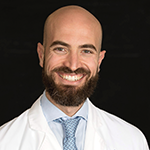 Andrea Fava, MD
Andrea Fava, MD
A rheumatology fellow at Johns Hopkins Medicine, Dr. Fava knows that although treatment of lupus nephritis relies on renal histopathological features, renal biopsies don’t capture patient-specific active biological pathways. He hopes his current research, studying new mechanisms of lupus nephritis, along with Michelle Petri, MD, MPH, director of the Johns Hopkins Lupus Center and a professor of medicine at Johns Hopkins School of Medicine, and the Accelerating Medicines Partnership will help change that.
“My goal is to decipher the mechanisms of lupus nephritis,” Dr. Fava says. “Harnessing the unprecedented power of new technologies, such as single cell genomics and urine proteomics, we are developing a liquid biopsy to assess the active kidney molecular pathways in a urine sample.”
Dr. Fava believes urine proteomic biomarkers could revolutionize the diagnosis and management of lupus nephritis by predicting active intrarenal biological pathways that could be noninvasively monitored over time.
After obtaining his medical degree and graduating summa cum laude from San Raffaele University, Milan, Italy, Dr. Fava moved to the U.S. for a post-doctoral research fellowship at Johns Hopkins to study the role of autoantigen-specific T cells in scleroderma with his mentors Francesco Boin, MD, director of the Division of Rheumatology and director of the new scleroderma program at the Kao Autoimmunity Institute, Cedars-Sinai, Los Angeles, and Antony Rosen, MBChB, BSc (Hons), Mary Betty Stevens Professor of Medicine, vice dean for research and director of the Division of Rheumatology at Johns Hopkins University School of Medicine. Dr. Fava also completed a visiting fellowship in computational biology at Harvard University, Boston, with Soumya Raychaudhuri, MD, PhD, professor of medicine and of biomedical informatics, Harvard Medical School.
“Receiving this award is a testament to a multitude of mentors, including Drs. Boin and Rosen, who taught me how to be a creative and rigorous scientist, and Dr. Raychaudhuri, who showed me how to approach big data with method and ingenuity,” Dr. Fava says. “In addition, Dr. Petri provides a daily example of how to strive to provide excellent care to lupus patients with humility and selflessness.”
Dr. Fava’s work was awarded the Lupus 2019 Merit Award at the 13th International Congress on SLE. He has also served as a member of the ACR Committee on Research and was selected to be a part of the Johns Hopkins Scientist Training Program. Dr. Fava will join the rheumatology faculty at Johns Hopkins in 2021.
“I am grateful to the ACR, my mentors at Johns Hopkins and the Accelerating Medicines Partnership for providing me with the opportunity to grow as a physician-scientist while performing impactful research,” Dr. Fava says.
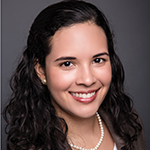 Ruth Fernandez-Ruiz, MD
Ruth Fernandez-Ruiz, MD
Dr. Fernandez-Ruiz, a postdoctoral fellow in the Division of Rheumatology at NYU Langone Health, New York City, hopes to become a translational physician-scientist. She is pursuing her master’s degree in clinical investigation (translational research) at the NYU Grossman School of Medicine and will graduate next year.
“My overall research purpose is to study associations between molecular signatures and clinical phenotypes that can help predict response to therapy and risk of organ damage in patients with SLE,” she says. “As a postdoctoral fellow in the lab of Timothy Niewold, MD, director of the Colton Center for Autoimmunity at NYU Langone, I am primarily focused on the interplay between type I interferons and SLE. One particular area of interest is the association between a PRKG1 gene variant and high type I interferon activity in patients with SLE.”
Under the mentorship of Peter Izmirly, MD, associate professor of medicine, NYU Grossman School of Medicine, and Jose U. Scher, MD, a rheumatologist at NYU Langone, Dr. Fernandez-Ruiz has also investigated the risk factors for poor outcomes in patients with SLE and COVID-19, resulting in a first-author publication in Arthritis & Rheumatology. In addition, she has worked with Dr. Izmirly and Jill Buyon, MD, director of the Division of Rheumatology, NYU Langone, and Sir Deryck and Lady Va Maughan Professor of Rheumatology, Department of Medicine, NYU Grossman School of Medicine, on assessing the outcomes of older patients with SLE after discontinuation of hydroxychloroquine.
“I’ve been fortunate to have the guidance of exceptional mentors in my career and I hope to someday pay that forward,” Dr. Fernandez-Ruiz says. “During my internal medicine residency, I was mentored by rheumatologist Namrata Singh, MD, MSCI, assistant professor of medicine, Division of Rheumatology, University of Washington, who always encouraged me to go into rheumatology; Dr. Niewold and Dr. Izmirly have been my main mentors at NYU Langone Health, allowing me to hone my research skills; and Michael Pillinger, MD, professor of medicine at NYU Grossman School of Medicine, and Dr. Buyon have helped pave my path to a successful career in rheumatology.”
A native of Venezuela, Dr. Fernandez-Ruiz attended medical school at the Central University of Venezuela, Caracas, where she graduated magna cum laude. She completed her internal medical residency at the Hospital de Clínicas Caracas, serving as chief resident during her last year of training. Dr. Fernandez-Ruiz moved to the U.S. to pursue an academic and research career and completed a second internal medicine residency at the University of Iowa, Iowa City, and her rheumatology fellowship at NYU Langone Health.
“I’m extremely honored to receive this award and believe it validates my efforts in research, education and patient care throughout fellowship,” Dr. Fernandez-Ruiz says. “It also motivates me to continue to work hard on my research endeavors.”
 Sarah French, MD
Sarah French, MD
After earning her medical degree at UCSF, Dr. French completed a residency in internal medicine at Stanford University School of Medicine, Palo Alto, Calif. She then returned to UCSF to complete a fellowship in rheumatology, serving as chief fellow.
Now a rheumatologist at UCSF, Dr. French’s research is focused on cardiopulmonary outcomes within the UCSF scleroderma cohort. She serves as co-director of the UCSF Scleroderma Clinic.
“I am particularly interested in understanding outcomes for scleroderma patients with coexisting pulmonary hypertension and interstitial lung disease, as traditionally prognosis is poor in this group, although a spectrum of disease exists,” Dr. French says. “Targeted PH therapy based on subtype and severity of lung disease, as well as access to early lung transplant, may improve survival in this group.”
Another of Dr. French’s research interests is improving care for patients with osteoporosis. One of her studies published last year looked at current performance for osteoporosis quality measures used by the Centers for Medicare & Medicaid Services for pay-for-performance programs and to describe recent quality improvement strategies around these measures.
“Our study found that despite increasing recognition of evidence-based quality measures for osteoporosis and incentives to improve upon performance for these measures, persistent gaps in care exist that will require further intervention into sustainable quality improvement interventions.”
Dr. French says she is appreciative of the tremendous mentors in her life who helped her hone approach to research and clinical questions.
“Dr. Boin served as my primary research mentor during my fellowship and inspired me with his level of dedication to patient care,” Dr. French says. “I witnessed countless patients benefiting from his thoughtful and thorough explanations of what it means to live with a diagnosis of scleroderma and in many ways. I’ve integrated his approach into my own practice.”
From a career development standpoint, Dr. French says Dr. Gensler offered constant support and helped her achieve her dream of joining the UCSF faculty.
“Receiving this award is a great honor,” Dr. French says. “I developed an early interest in rheumatology as a medical student participating in the Rheumatology Research Foundation preceptorship and it is amazing to reflect upon my journey thus far. I’m grateful to the ACR and the Rheumatology Research Foundation for providing me with wonderful opportunities for educational and research development along the way.”
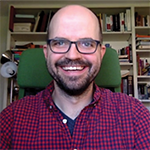 Isaac T.W. Harley, MD, PhD, MS
Isaac T.W. Harley, MD, PhD, MS
Dr. Harley, an instructor of rheumatology at both the University of Colorado, Anschutz Medical Campus, Aurora, and the Rocky Mountain Regional Veterans Affairs Medical Center, Aurora, began contributing to lupus research in the summer of 2001 as a summer student in college. Today, his research is focused on looking at the application of genomics to improve care for rheumatic diseases.
“My best guess is that of the 3 billion base pairs that make up the human genome, about 1,000 regions harbor genetic variants that impact the risk of lupus and other autoimmune diseases. My goal is to figure out how each of these variants change the function of immune cells, so we can develop better therapies for autoimmune diseases, especially lupus,” Dr. Harley says. “Recently, we defined a single base pair difference that changes the risk for lupus by decreasing the expression of a gene called microRNA-146A. MicroRNA-146A is known to put the brakes on several other lupus risk genes. Currently, we are working to figure out which immune cells this gene puts the brakes on. We ultimately hope to be able to develop therapies to target this gene in lupus patients.”
Dr. Harley received his bachelor’s and master’s degrees from the University of Oklahoma, Norman, and his medical degree from the University of Cincinnati College of Medicine. While there, Dr. Harley went on to pursue a PhD in immunobiology, and later joined the residency program in internal medicine at the University of Colorado School of Medicine (UCSOM) as part of its Physician-Scientist Training Program.
He stayed at UCSOM for fellowship training and credits his success in part to the many excellent mentors he’s had, including John Cambier, PhD, distinguished professor and past chair of the Department of Immunology and Microbiology, as well as Dr. Harley’s fellowship research mentor at UCSOM; many others in the rheumatology program at UCSOM; and his father, John Harley, MD, director of the Center for Autoimmune Genomics and Etiology, Cincinnati Children’s Hospital.
“My dad encouraged my interest, but never pushed me into a career in medicine or rheumatology,” Dr. Harley says. “He let me discover how much fun it is on my own.”
Dr. Harley hopes his future research will reveal a lupus patient’s genetic risk can be quantified—to improve patient care—and determine the non-genetic risks for lupus.
“I’m honored to receive this award and hope it will be a little bit easier to get the resources that I will need to accomplish my research goals,” Dr. Harley says. “This is really exciting, because I think there’s great potential to improve lupus therapy with this new therapeutic approach—reversing the effect of low microRNA-146A expression.”
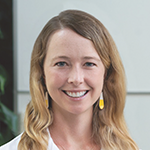 Rosemary Peterson, MD, MSCE
Rosemary Peterson, MD, MSCE
As a pediatric rheumatologist at Dell Children’s Medical Center of Central Texas, Austin, Dr. Peterson has devoted much of her research to studying outcomes in systemic juvenile idiopathic arthritis (sJIA), a condition that has high morbidity and mortality compared with other subtypes of JIA.
“Increasing evidence has emerged over the past 10 years for improved outcomes in sJIA with first-line treatment with biologic therapy,” Dr. Peterson says. “Despite this, there remains significant treatment variation among providers and persistent high rates of glucocorticoid exposure, particularly in children hospitalized with new-onset sJIA.”
Dr. Peterson says the overarching goal of her clinical research efforts is to characterize treatment variation in this patient population across 52 tertiary care children’s hospitals in the U.S. and study the effect of first-line biologic initiation on important clinical outcomes, including glucocorticoid exposure.
“I hope the results of my research will assist in identifying barriers to implementation of evidence-based care and provide additional clinical effectiveness data for first-line use of biologics in children hospitalized with new-onset sJIA,” she says.
A native of Philadelphia, Dr. Peterson graduated magna cum laude from the University of Notre Dame, Indiana, with a double major in psychology and science pre-professional studies. After obtaining her medical degree from UT Southwestern Medical School, she completed an internship and residency at Lucile Packard Children’s Hospital Stanford. Dr. Peterson then returned to her hometown for a pediatric rheumatology fellowship at the Children’s Hospital of Philadelphia (CHOP). During her fellowship training, Dr. Peterson pursued advanced training in clinical research and obtained a master’s in clinical epidemiology from the University of Pennsylvania.
In addition to her clinical research in systemic juvenile idiopathic arthritis, Dr. Peterson became engaged in quality improvement work during her fellowship, leading a division QI project to standardize dissemination of transition policies and care team communication surrounding the transition from pediatric to adult care. Her project was presented as a poster presentation during ACR Convergence 2020. She hopes to continue transition quality improvement work at a local level and in collaboration with CARRA.
“I’ve been fortunate to have an amazing group of mentors with the CHOP Division of Rheumatology, who have supported my clinical and academic development from day one of fellowship. In particular, my primary MSCE mentor, Pamela Weiss, MD, MSCE, attending physician, associate professor and director of clinical research in the Division of Rheumatology at CHOP, who has been instrumental in guiding the development and completion of my thesis project in systemic JIA,” Dr. Peterson says.
 Stefanie Wade, MD
Stefanie Wade, MD
A native of Vancouver, B.C., Dr. Wade is a clinical research fellow in the Division of Rheumatology and Immunology at Beth Israel Deaconess Medical Center (BIDMC), Harvard Medical School. She is currently in the third year of rheumatology fellowship training within the clinical research track.
Dr. Wade is engaged in translational research in SLE. Under the mentorship of Vasileios Kyttaris, MD, director of the BIDMC Rheumatology Fellowship Program and assistant professor of medicine at Harvard Medical School, she is investigating whether circulating pro-inflammatory cytokines precede complement activation and predict lupus flares more accurately.
Before beginning her rheumatology fellowship, Dr. Wade served as a chief medical resident at the University of Connecticut, Storrs, and developed a strong interest in medical education and quality improvement. As a second-year fellow, she received formal training in medical education through the prestigious clinical education track at BIDMC. Throughout her fellowship, Dr. Wade has been conducting an education-related quality improvement project assessing active learning within BIDMC’s Division of Rheumatology.
“I’m looking at ways to incorporate active learning into rheumatology training programs, as opposed to passive learning where an instructor stands at the podium giving a lecture,” Dr. Wade says. “We’ve implemented a flipped classroom approach in our introductory rheumatology curriculum where fellows are introduced to content at home, allowing lecture time to be used for inquiry, application and evaluation by working through clinical cases. We found a statistically significant increase in active learning scores pre- vs. post-intervention. Because active learning is associated with better knowledge acquisition and retention in medical education, my hope is that we can apply these findings to increase engagement within rheumatology training programs.”
Dr. Wade received her undergraduate degree from the University of Victoria, B.C., and her medical degree from St. George’s University, Grenada, West Indies. She completed her medical internal medicine training at the University of Connecticut, Storrs.
During her residency, she was inspired by Mollie Caruthers, MD, FRCPC, a clinical associate professor of rheumatology, University of British Columbia, Vancouver, and one of her mentors, to look at clinical outcomes in autoimmune diseases, particularly concerning medical selection and appropriateness of current monitoring strategies.
At the 2019 ACR/ARP Annual Meeting, Dr. Wade presented her clinical research on rituximab-induced hypogammaglobulinemia. This year, Dr. Wade was appointed to the ACR Committee on Rheumatology Training and Workforce Issues and presented results from her active learning research at ACR Convergence 2020. After her fellowship, she hopes to continue working in academics as a clinician-educator.
“I feel honored to receive this award and to have the support of an amazing group of mentors at BIDMC,” Dr. Wade says.
 Chio Yokose, MD
Chio Yokose, MD
As a rheumatologist and clinical researcher at Massachusetts General Hospital (MGH), Boston, Dr. Yokose is working to understand why patients with gout also have a high burden of cardiometabolic comorbidities. Dr. Yokose finished her fellowship training this year and is now an instructor in medicine at MGH and Harvard Medical School.
“My research has focused on explaining why patients with gout experience premature mortality, primarily driven by cardiovascular disease, and what can be done to mitigate it,” Dr. Yokose says. “We’ve looked into how lifestyle factors such as diet and exercise affect one’s risk of gout and cardiometabolic comorbidities. Additionally, we’re investigating the novel use of dual-energy CT to determine if monosodium urate crystals, the causative crystals in gout, may also deposit in blood vessels to lead to higher burden of cardiovascular disease among gout patients.”
Her research has been supported by the T32 research training grant at MGH, and Dr. Yokose was awarded the Rheumatology Research Foundation Scientist Development Award to continue her work in novel applications of dual-energy computerized tomography technology to attempt to explain the association between gout and cardiovascular disease.
Born in Tokyo and raised in Connecticut, Dr. Yokose completed her undergraduate degree at Brown University, Providence, R.I. She attended medical school at Northwestern University, Feinberg School of Medicine, Chicago, and completed her training in internal medicine at NYU Langone Medical Center. Shortly after completing her residency, Dr. Yokose joined the MGH Division of Rheumatology.
“I’ve been fortunate to have many wonderful mentors, including Michael Pillinger, MD, professor of medicine, NYU Grossman School of Medicine, who played a very important role in my decision to pursue a career in clinical rheumatology research with a particular focus on gout,” Dr. Yokose says. “Also, Hyon K. Choi, MD, DrPH, professor of medicine, Harvard Medical School, and director of clinical epidemiology, MGH, who has taught me so much about gout research since I began my fellowship; and Marcy B. Bolster, MD, associate professor of medicine, Harvard Medical School, and director of the Rheumatology Fellowship Program in the Division of Rheumatology, Allergy and Immunology at Massachusetts General.”
Dr. Yokose is a member of the Gout and Crystal Arthropathy Center at MGH, where she has spearheaded the development of gout and pseudogout registries. A strong believer in patient education, Dr. Yokose has delivered talks on osteoarthritis and gout at the Maxwell and Eleanor Blum Patient and Family Learning Center at MGH and has contributed a chapter on scleroderma for a patient education book.
“Receiving this award is a tremendous honor,” Dr. Yokose says. “I’m very appreciative of all of the support I have received along the way from my family, friends and colleagues.”
Linda Childers is a health writer located in the San Francisco Bay Area.
Inaugural ACR Distinguished Global Public Health Award Presented to Dr. Fauci
By Susan Bernstein
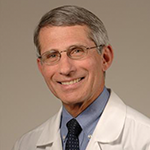 ACR CONVERGENCE 2020—At the ACR’s fully virtual annual meeting on Saturday, Nov. 7, ACR President Ellen M. Gravallese, MD, chief of the Division of Rheumatology, Inflammation and Immunity at Brigham and Women’s Hospital, Boston, presented the inaugural ACR Distinguished Global Public Health Award to Anthony S. Fauci, MD, director of the National Institute of Allergy and Infectious Diseases (NIAID), an ACR Master and the 2008 recipient of the U.S. Presidential Medal of Freedom.
ACR CONVERGENCE 2020—At the ACR’s fully virtual annual meeting on Saturday, Nov. 7, ACR President Ellen M. Gravallese, MD, chief of the Division of Rheumatology, Inflammation and Immunity at Brigham and Women’s Hospital, Boston, presented the inaugural ACR Distinguished Global Public Health Award to Anthony S. Fauci, MD, director of the National Institute of Allergy and Infectious Diseases (NIAID), an ACR Master and the 2008 recipient of the U.S. Presidential Medal of Freedom.
“I would like to acknowledge Dr. Fauci for his close involvement in the work to address the COVID-19 pandemic and for his evidence-based approach,” said Dr. Gravallese, who added that the award honors his “exemplary contributions to advance global health. We honor you for all of your remarkable contributions over a lifetime and wish to express our gratitude.”
In accepting the award, Dr. Fauci said, “As some of you may know, I started my NIH career studying rheumatological disease in the laboratory of the late Sheldon Wolff, [MD]. So, as an erstwhile rheumatologist, it is my special honor to be recognized with the ACR Distinguished Global Public Health Award. Thank you for this recognition and for all your good work, especially during these difficult times.”
In closing remarks, Gregg Silverman, MD, professor of medicine at NYU Langone Grossman School of Medicine and Basic Science Subchair of the Annual Meeting Planning Committee, recalled working under Tony Fauci early in his career in infectious disease research. “He is a preeminent example of a physician-scientist and a role model for all of us. Let’s all be proud of what Tony has given us. Who could be a more appropriate candidate for the 2020 Distinguished Global Health Award,” Dr. Silverman said. “If this were not a Zoom-virtual world right now, I would ask everyone in the audience to stand and give Tony a well-deserved round of applause.”
Susan Bernstein is a freelance journalist based in Atlanta.



